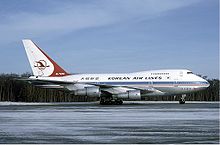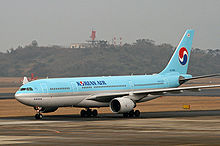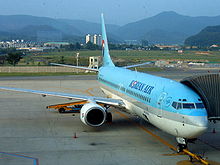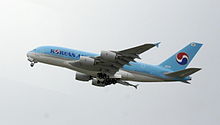- Korean Air
-
Korean Air
대한항공
大韓航空
Daehan Hanggong
IATA
KEICAO
KALCallsign
KOREAN AIRFounded 1962 Hubs Focus cities Frequent-flyer program SKYPASS Airport lounge KAL Lounge Alliance SkyTeam Subsidiaries Jin Air Fleet size 140 (+ 58 orders) incl. cargo Destinations 116 Company slogan Excellence in Flight Parent company Hanjin Group Headquarters Gonghang-dong, Gangseo-gu, Seoul, South Korea Key people Cho Yangho (Chairman & CEO) Website koreanair.com Korean name Hangul 대한항공 Hanja 大韓航空 Revised Romanization Daehan Hanggong McCune–Reischauer Taehan Hanggong Korean Air Lines Co., Ltd. (KRX: 003490), operating as Korean Air, is both the flag carrier and the largest airline of South Korea, with global headquarters located in Seoul, South Korea. Korean Air's international passenger division and related subsidiary cargo division together serve 130 cities in 45 countries, while its domestic division serves 20 destinations. It is among the top 20 airlines in the world in terms of passengers carried and is also the top-ranked international cargo airline. Incheon International Airport serves as Korean Air's international hub. Korean Air also maintains a satellite headquarters campus at Incheon.
Korean Air's main global headquarters campus, the Korean Air Operations Center (대한항공 빌딩[1]), is located in Gonghang-dong, Gangseo-gu in Seoul. Korean Air also maintains a domestic office campus at Gimpo International Airport in Seoul. Korean Air's lesser domestic hubs are based at Jeju International Airport, Jeju and Gimhae International Airport, Busan.[2] The maintenance facilities are located in Gimhae International Airport.
Skytrax rates Korean Air as a four-star (out of five) airline.[3] As of Spring 2011, Korean Air offers the broadest selections of Asian routes departing from North America.[4] Its main rival is Asiana Airlines, the second largest South Korean carrier. Korean Air is a founding partner airline of SkyTeam, the world's second largest airline alliance.
Contents
History
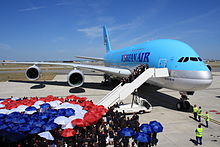 Korean Air takes delivery of its first Airbus A380 at Toulouse-Blagnac Airport, France, 25th May 2011.
Korean Air takes delivery of its first Airbus A380 at Toulouse-Blagnac Airport, France, 25th May 2011.
Korean Air was founded by the South Korean government in 1962 as Korean Air Lines to replace Korean National Airlines,which was founded in 1946. On 1 March 1969 the Hanjin Transport Group took control of the fledgling airline. Long-haul freight operations were introduced on 26 April 1971 followed by passenger services to Los Angeles International Airport(LAX) on 19 April 1972.[2]
International flights to Hong Kong, Taiwan, and Los Angeles were flown with Boeing 707s until the introduction of Boeing 747 in 1973. In 1973, KAL introduced Boeing 747s on their Pacific routes and started a European service to Paris using the 707 and DC-10. In 1975 KAL became one of Airbus's first Asian customers with the purchase of three A300s, which were put into immediate service on Asian routes.[5]
A blue-top, silver and redesigned livery with a new corporate "Korean Air" logo featuring an accented, stylized "taegeukgi" design was introduced on 1 March 1984 and the airline's name changed to Korean Air from Korean Air Lines. This livery was introduced on its Fokker F28s. It was designed in cooperation between Korean Air and Boeing. In 1990s Korean Air became the first airline to use the new MD-11 to supplement its new fleet of Boeing 747-400s. However, MD-11 did not meet the set performance and they were converted to freighters (in addition to 747 freighters).
As of 2007, Korean Air was in negotiations to open its China hub in Beijing or Shanghai by the end of 2008.
The airline has 16,623 employees (as of March 2007).[2] On 5 June 2007, Korean Air said that it would create a new low-cost carrier in Korea to compete with Korea's KTX super-high speed railway network system, which offers cheaper fares and less stringent security procedures compared to air travel. Korean Air's low-cost subsidiary is Jin Air, which started its scheduled passenger service from Seoul to Jeju on 17 July 2008. Korean Air announced that some of its B737s and A300s would be given to Jin air.
In the 1980s Korean Air's head office was in the KAL Building on Namdaemunno, Jung-gu, Seoul.[6]
By 2009 Korean Air's image had become more prestigious, differing from the image of the late 1990s, which was tarnished by several fatal accidents.[7]
In mid-2010, a co-marketing deal with games company Blizzard Entertainment sent a B747-400 and a B737-900 taking to the skies wrapped in StarCraft II branding.[8] In August 2010, Korean Air announced heavy second-quarter losses despite record high revenue.[9] Also in August 2010, Hanjin Group (the parent of Korean) opened a new cargo terminal at Navoi in Uzbekistan, which will become a cargo hub with regular Incheon-Navoi-Milan flights.[10]
In May 2011, the carrier took delivery of its first Airbus A380, and signed a deal with Amadeus IT Group that outsourced the carrier's reservation and passenger processing systems.[11][12]
Destinations
Korean Air, along with Air France, British Airways, Delta Air Lines, Emirates Airlines, Malaysia Airlines, Qantas, Qatar Airways, Singapore Airlines, South African Airways, and United Airlines, is one of the few airlines that fly to all six inhabited continents.
Main article: Korean Air destinations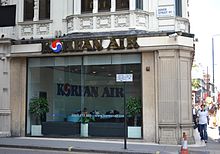 Korean Air Europe Headquarters in London
Korean Air Europe Headquarters in London
Korean Air has codeshare agreements, beside SkyTeam members, with the following airlines:
- Aircalin
- Air Macau
- Alaska Airlines
- Emirates
- Garuda Indonesia (future SkyTeam member)
- Hawaiian Airlines
- Japan Airlines (Oneworld)
- LAN Airlines (Oneworld)
- Malaysia Airlines (future Oneworld member)
- MIAT Mongolian Airlines
- Rossiya Airlines
- Uzbekistan Airways
- Xiamen Airlines (future SkyTeam affiliate member)
Korean Air is an airline partner of Skywards, the frequent-flyer program for Emirates. Skywards members can earn miles for flying Korean Air and can redeem miles for free flights. In addition, on certain routes Korean Air's codesharing agreement with Malaysia Airlines also allows Malaysia Airline's Enrich members to earn miles even though when flying with Korean Air.[citation needed]
Corporate affairs
Korean Air's main global headquarters campus, the Korean Air Operations Center (대한항공 빌딩[1]), is located in Gonghang-dong, Gangseo-gu in Seoul.[13]
The North America headquarters for passenger operations is located in Westlake, Los Angeles, United States, while its cargo operations for North America are on the property of Los Angeles International Airport in Westchester, Los Angeles.[14] The European headquarters are located in the City of Westminster, London.[15] The Paris office is in the 1st arrondissement of Paris.[16] The Germany office is in Westend, Frankfurt.[17] The Commonwealth of Independent States headquarters are located in Tverskoy District, Central Administrative Okrug, Moscow, Russia.[18] Its Southeast Asia/Oceania headquarters are in the Ocean Tower (海洋大楼 Hǎiyáng Dàlóu) in Singapore.[19] Its Japan headquarters are in the Tokyo Korean Air Building (KALビル KAL Biru) in Shiba, Minato, Tokyo.[20] Its China offices are in the Hyundai Motor Tower (现代汽车大厦 Xiàndài qìchē dàshà) in Chaoyang District, Beijing.[21] Its Hong Kong sales office is in Tower 2 of the South Seas Center (南洋中心 Mandarin: Nányáng Zhōngxīn) in Kowloon.[22]
Fleet
The Korean Air Boeing customer code is B5; hence, any aircraft purchased directly from Boeing features this code in registration (747-400 - 747-4B5).
Its fleet consists of the following aircraft (at 01 Jul 2011):[23][24]
Korean Air Passenger Fleet Aircraft Total Orders Passengers[25] Notes F C Y Total Airbus A300-600R 7 — —
—24
24242
252266
276To be Phased out (HL7242 Lease Expired on 11/04/11)[26] Airbus A330-200 7 7 6 24 196 226 Airbus A330-300 16 — 6 22 252 280 Airbus A380-800 4 6 12 94 301 407 Boeing 737-700 1 — — — — — Boeing 737-800 15 — —
—
—
—16
8
12
12129
141
150
126145
149
162
138Boeing 737-900 16 — — 8 180 188 Boeing 737-900ER 2 2 — 12 147 159 Boeing 747-400 17 — 10
12
1661
61
58262
262
310333
335
384Boeing 747-8I — 5 TBA Boeing 777-200ER 18 — 8
828
28212
225248
261Boeing 777-300 4 — 6 35 301 342 Boeing 777-300ER 8 6 8 56 227 291 Boeing 787-9 — 10 TBA Order converted to Boeing 787-9 from 787-8[27] Bombardier CS300 — 10 TBA 10 options and 10 purchase rights Korean Air Cargo Fleet Boeing 747-400BCF 7 — N/A Boeing 747-400ERF 8 — N/A Boeing 747-400F 9 — N/A Boeing 747-8F — 7 N/A [28] Boeing 777F — 5 N/A Total 140 58 Korean Air is the first Airbus A380 customer to dedicate the entire upper deck of the A380 to business class passengers (comprising 94 of Korean Air’s lie-flat Prestige Class business seating). Korean Air announced on 4 December 2009 that it would order five Boeing 747-8 Intercontinental aircraft worth $1.5 billion in list prices.[29] This is in addition to the seven Boeing 747-8F freighters Korean Air Cargo will be operating.[30]
Interior
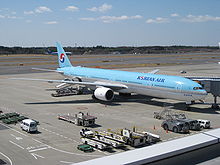 A Boeing 777-300 being serviced at Narita International Airport
A Boeing 777-300 being serviced at Narita International Airport
Korean Air serves four types of first classes, three types of business (Prestige) classes, and a two types of economy class. First Classes are either "Kosmo Suite" (on entire Boeing 777-300ER fleet, some 777-200ER fleet, all Airbus A380 fleet) seats, "Kosmo Sleeper" (on some Boeing 747-400 and 777-200ER fleet), Sleeper (on some Boeing 747-400 and 777-300 and all Airbus 330), and old first class seats. All "Kosmo Suite", "Kosmo Sleeper", and "Sleeper" seats recline to 180 degrees, while old first class seats, which are in the process of being phased out, recline up to 150 degrees. Prestige Class seats are either "Prestige Sleeper" (on entire 777-300ER, 777-200ER fleet that feature "Kosmo Suite" seats, and A380 fleet), "Prestige Plus" (on most Boeing 777-200ER, Boeing 747-400 and one Boeing 777-300), or old Prestige Class seats. "Prestige Sleeper" seats recline to 180 degrees, while Prestige Plus seats recline up to 172 degrees. Old Prestige Class seats recline up to 138 degrees. Old Prestige Class seats are being phased out except for Airbus 300-600, Boeing 747-400 Combi, and Boeing 737 aircraft. Economy class seats recline up to 121 degrees, and a new type of seats called New Economy Class are installed on all of Boeing 777-300ER and Boeing 777-200ER aircraft with Kosmo Suite, all Boeing 777-300 aircraft, some Airbus A330-300 and 200 aircraft, and Airbus A380 when they enter service.
The brand new first class, the "Kosmo Suite" seats, and the business class, "Prestige Sleeper" seats were first introduced in the Boeing 777-300ERs in May 2009.[31] Both seats could stretch to 180 degrees, and became more private than seats before.
The color 'Celadon Green', which represents the characteristics of Korea, is incorporated as the primary dominant colors to all "First Class" and "Prestige Class" seats. Dark blue and Mocha Chocolate colors are used in economy seats.
The Korean Air Airbus A380-800 aircraft also feature an in-flight bar, called the Celestial Bar in partnership with Absolut Vodka, featuring a range of Absolut cocktails along with an integrated lounge space.[32] It is located on the upper deck Business Class cabin and accessible only to First and Prestige class passengers. On the lower deck of the A380, there is a Lancome-designed[33] Duty Free shop located in the rear of the cabin as well which is available to all passengers.
Loyalty program
SKYPASS is the frequent-flyer program of Korean Air. "SKYPASS" also refers to the blue card which Korean Air frequent flyers are given. The motto of SKYPASS is "Beyond your Imagination". The program's elite levels are comparable to those of other airlines' frequent flyer programs, requiring members to fly a 30,000 miles per two-year cycle.(initial entry into this level requires 50,000 miles) Qualification for the highest level is based on lifetime flight miles, requiring a customer to fly 1 million miles for Million Miler, which is the highest elite status, or 500,000 miles for Morning Calm Premium, which comes second. Both membership levels are eligible for SkyTeam Elite Plus privileges. Membership in these levels are granted for life.
Aerospace research and manufacturing
Korean Air is also involved in aerospace research and manufacturing. The division, known as the Korean Air Aerospace Division (KAL-ASD), manufactures licensed versions of the MD 500 and UH-60 Black Hawk helicopters and the F-5E/F Tiger II fighter aircraft,[34] the aft fuselage and wings for the KF-16 fighter aircraft manufactured by Korean Aerospace Industries,[35] and parts for various commercial aircraft including the Boeing 737, 747, 777, 787 and the Airbus A330, and A380.[36] In 1991 the division designed and flew the Korean Air Chang-Gong 91 light aircraft. KAA also provides aircraft maintenance support for the United States Department of Defense in Asia and maintains a research division with focuses on launch vehicle, satellite, commercial and military aircraft, helicopter, and simulation systems.[37]
Incidents and accidents
Main article: Korean Air incidents and accidentsKorean Air had many fatal accidents between 1970 and 1999, during which time it wrote off 16 aircraft in serious incidents and accidents with the loss of 700 lives. On Sept. 1, 1983, Korean Air Lines Flight 007, carrying 269 people, including a sitting U.S. Congressman, Larry McDonald, was shot down by the Soviets west of Sakhalin Island. Since the last fatality in 1999, safety has greatly improved.[38] The last fatal passenger incident was the Korean Air Flight 801 crash in 1997. The latest crew fatality was Korean Air Cargo flight 8509 in December 1999.
See also
- Transport in South Korea
- List of companies of South Korea
- List of airlines of South Korea
- List of airports in South Korea
References
- ^ a b "일반현황 / 기업개요". Korean Air. http://www.koreanair.com/local/jp/gd/kor/au/ci/kor_au_ci_ov.jsp. Retrieved 9 September 2010. "주소: 서울 특별시 강서구 공항동 1370번지 대한항공 빌딩"
- ^ a b c "Directory: World Airlines". Flight International: p. 102. 2007-04-03.
- ^ "THE WORLD'S OFFICIAL 4-STAR AIRLINES". Skytrax. http://www.airlinequality.com/StarRanking/4star.htm. Retrieved 3 July 2010.
- ^ Korean Air Rated Best Asian Airline
- ^ Korean Air Lines Co., Ltd. History
- ^ "World Airline Directory." Flight International. May 16, 1981. 1444.
- ^ Yu, Roger. "Korean Air upgrades service, image." USA Today. August 26, 2009. Retrieved on September 16, 2009.
- ^ Citizen, Jessica (2010-06-25). "Korea is getting a StarCraft II plane". GamePron. http://www.gamepron.com/news/2010/06/24/korea-is-getting-a-starcraft-ii-plane/. Retrieved 2010-06-25.
- ^ "Korean Air slides to second quarter loss but touts 'record high' revenue". ATW Online. 2010-08-16. http://atwonline.com/airline-finance-data/news/korean-air-slides-second-quarter-loss-touts-record-high-revenue-0813. Retrieved 2010-08-16.
- ^ "Navoi Cargo Terminal opens in Uzbekistan; Korean Air to expand cargo network". ATW Online. 2010-08-16. http://atwonline.com/airports-routes/news/navoi-cargo-terminal-opens-uzbekistan-korean-air-expand-cargo-network-0812. Retrieved 2010-08-16.
- ^ "Korean takes delivery of first A380". Australian aviation. 2011-05-27. http://australianaviation.com.au/2011/05/korean-takes-delivery-of-first-a380/.
- ^ "Korean Air and TOPAS partner Amadeus". Travel News. 2011-05-27. http://www.traveldailyasia.com/AsiaPacificNews/Detail.aspx?Section=56561/.
- ^ "Company Info / Overview". Korean Air. http://www.koreanair.com/local/na/gd/eng/au/ci/eng_au_ci_ov.jsp. Retrieved 20 September 2008. "Address(Headquarters) Korean Air Operations Center 1370, Gonghang-dong, Gangseo-gu, Seoul, Korea 157-712 ."
- ^ "Company Info / Contact Info." Korean Air. Retrieved on August 30, 2011. "The Americas Headquarters Passenger 1813 Wilshire Blvd., 4th Floor Los Angeles, CA 90057 Cargo 6101 W. Imperial Hwy. Los Angeles, CA 90045"
- ^ "Company Info / Contact Info." Korean Air. Retrieved on 30 August 2011. "Europe Headquarters 66/68 Piccadilly, London, W1J 0HJ, U.K"
- ^ "Aperçu / Info de Contact." Korean Air. Retrieved on 30 August 2011. "Sièges en Europe 9 boulevard de la Madeleine 75001 Paris France"
- ^ "Überblick / Kontakt Info." Korean Air. Retrieved on 30 August 2011. "Niderlassung in Deutschland An der Welle 4, 60322 Frankfurt am Main"
- ^ "Company Info / Contact Info." Korean Air. Retrieved on 30 August 2011. "CIS Headquarters Bolshoy Gnezdnykovsky Pereulok D1/2, Moscow, Russia" Address in Russian: "Большой Гнездниковский переулок 1/2 Москва Россия"
- ^ "Company Info / Contact Info." Korean Air. Retrieved on August 30, 2011. "Southeast Asia Headquarters 20 Raffles Place Ocean Tower #26-01 Singapore 048620" - Address in Chinese: "東南亞地域本部 莱佛士坊20号 海洋大楼26楼01/05号 新加坡048620"
- ^ "Company Info / Contact Info." Korean Air. Retrieved on August 30, 2011. "Japan Headquarters Tokyo Korean Air Building, 3-4-15, Shiba Minato-ku Tokyo 105-0014" Address in Japanese: "日本地域本部 〒105-0014 東京都港区芝3-4-15 東京KALビル"
- ^ "公司资料 / 联系信息." Korean Air. Retrieved on August 30, 2011. "China Headquarters Unit 1, 9th Floor, Hyundai Motor Tower No 38, Xiao Yun Road, Chao Yang District, Beijing, China" - Address in Chinese: "中国总部 北京市朝阳区霄云路38号现代汽车大厦"
- ^ "Company Info / Contact Info." Korean Air. Retrieved on 30 August 2011. "Hong Kong Sales Office 11/F South Seas Center, Tower 2, 75 Mody Road T.S.T. East, Kowloon Hong Kong" - Address in Chinese: "香港支店 香港, 九龍, 尖沙咀東部,麼地道75號, 南洋中心第二座11樓"
- ^ 항공기 소개"[1]"(in Korean)
- ^ CH-Aviation - Airline News, Fleet Lists & More
- ^ Korean Air official fleet page
- ^ http://asms.casa.go.kr/NewAsms/asms_safe/menu01.asp?menu=18 (Korean)
- ^ http://www.flightglobal.com/articles/2011/03/18/354506/korean-air-converts-10-787-8s-to-9s.html
- ^ http://www.flightglobal.com/articles/2011/03/18/354507/korean-air-firms-up-two-additional-747-8f-options.html
- ^ Korean Air announced order of 5 Boeing 747-8I
- ^ "KAL orders five Boeing 747-8 passenger aircraft". Flight Global, 4 December 2009.
- ^ "Korean Air introduces premium seats" (in Korean). http://news.kukinews.com/article/view.asp?page=1&gCode=eco&arcid=0921274092&cp=nv.
- ^ "Absolut Celestial Bar on Korean Air A380 aircrafts". Contrast Magazine. http://contrastmagazine.com/blog/?p=9450. Retrieved 8 August 2011.
- ^ "Lancome Opening Duty-Free Shops on Korean Air's A380 Airplanes". Racked.com. http://racked.com/archives/2011/04/15/lancome-opening-dutyfree-shops-on-korean-airs-a380-airplanes.php. Retrieved 8 August 2011.
- ^ GlobalSecurity.org
- ^ Lockheed Martin - Republic of Korea
- ^ Carrier moonlights in aerospace
- ^ Korean Air Aerospace Division Official Website
- ^ Kirk, Don. "New Standards Mean Korean Air Is Coming Off Many 'Shun' Lists." The New York Times. Tuesday March 26, 2002. Retrieved on September 23, 2009.
External links
- Korean Air official website
- Korean Air (Korean) (Archive)
- Morning Calm inflight magazine
- Korean Air Cargo
- Korean Air Aerospace Division
- Korean Air Channel - YouTube
Categories:- Companies listed on the Korea Stock Exchange
- Aerospace companies of South Korea
- Aircraft manufacturers of South Korea
- Airlines established in 1962
- Airlines of South Korea
- Association of Asia Pacific Airlines
- IATA members
- Korean Air
- SkyTeam
Wikimedia Foundation. 2010.

